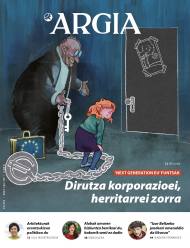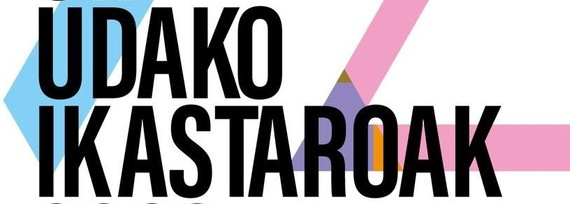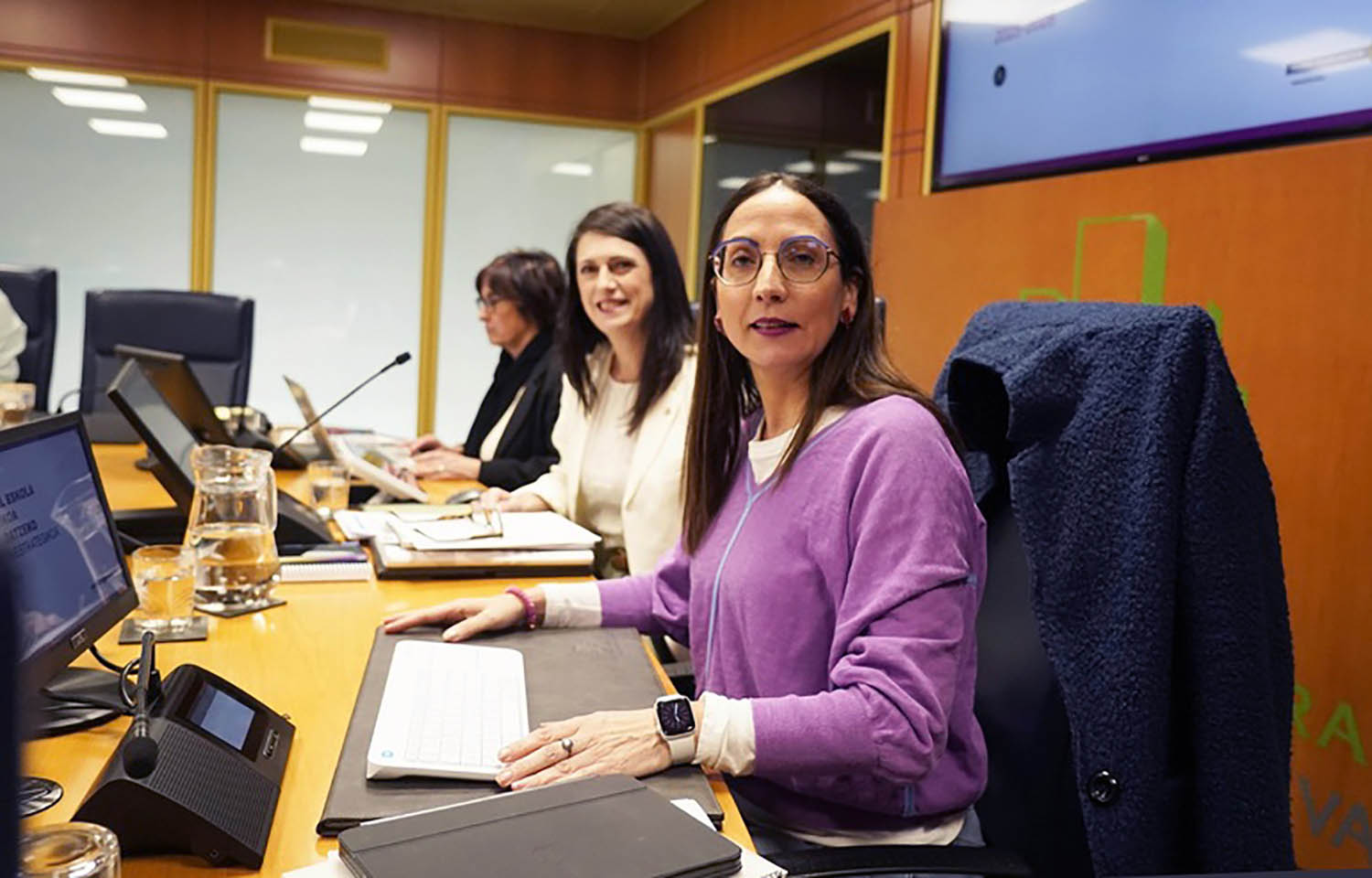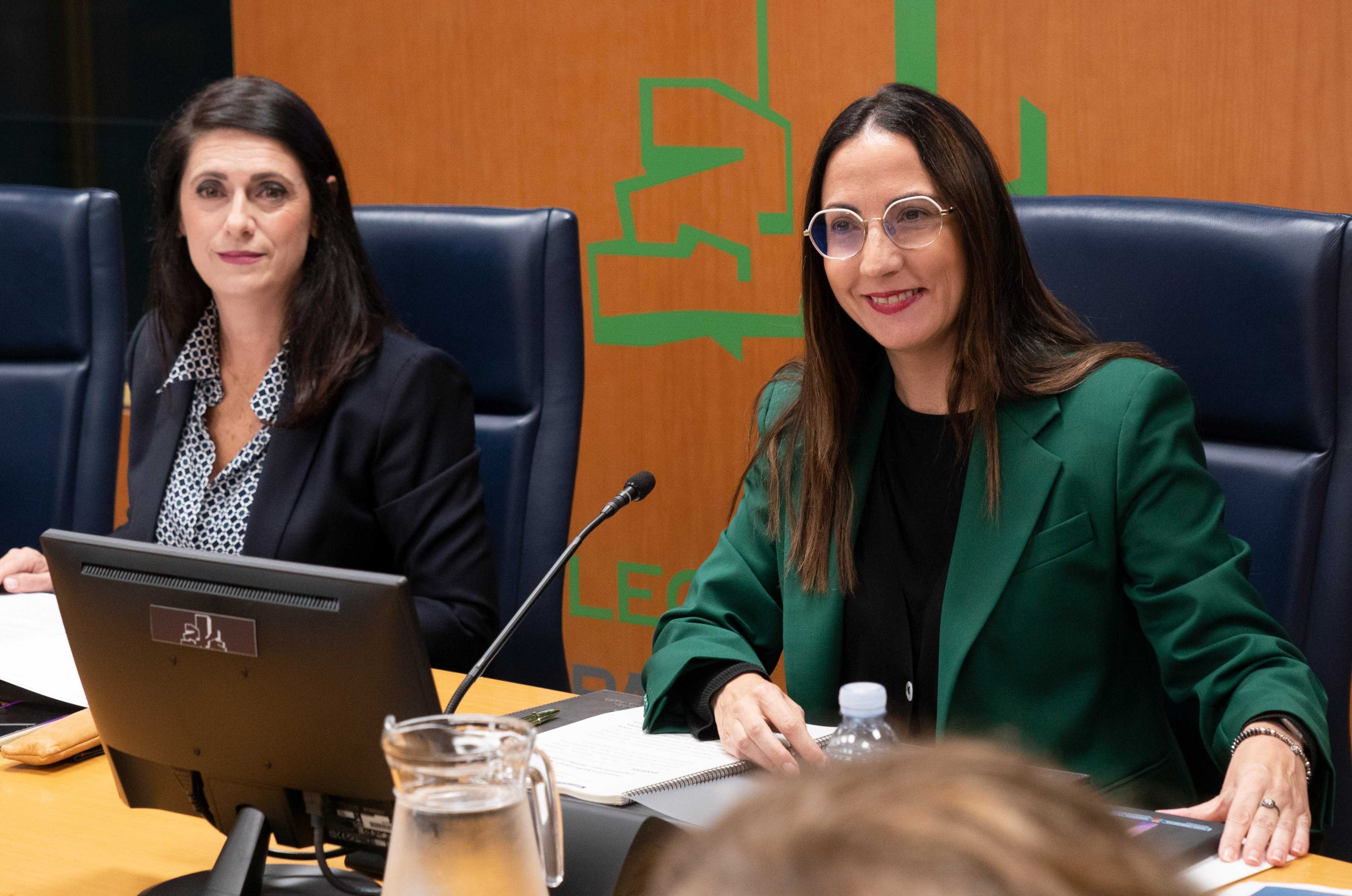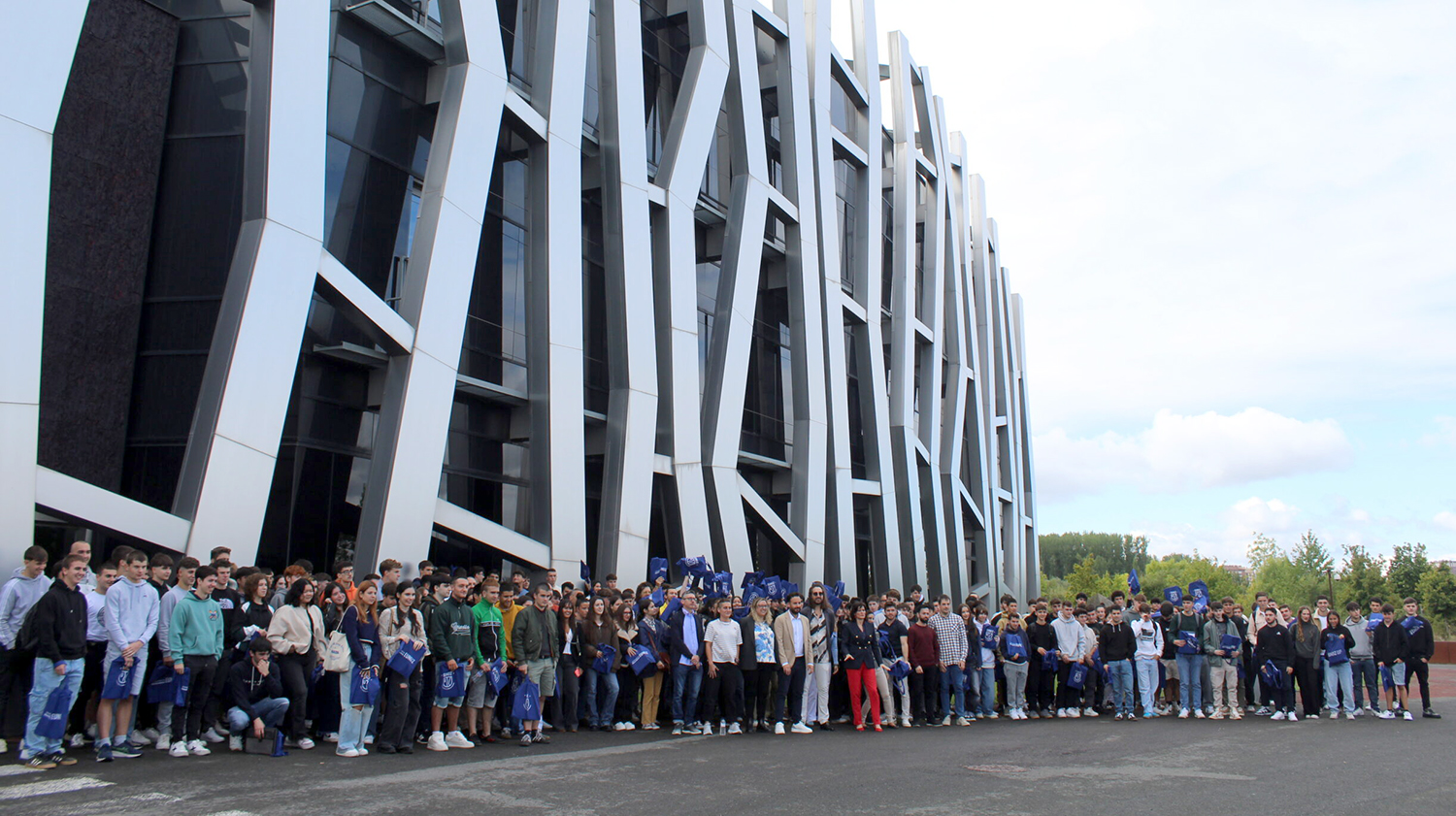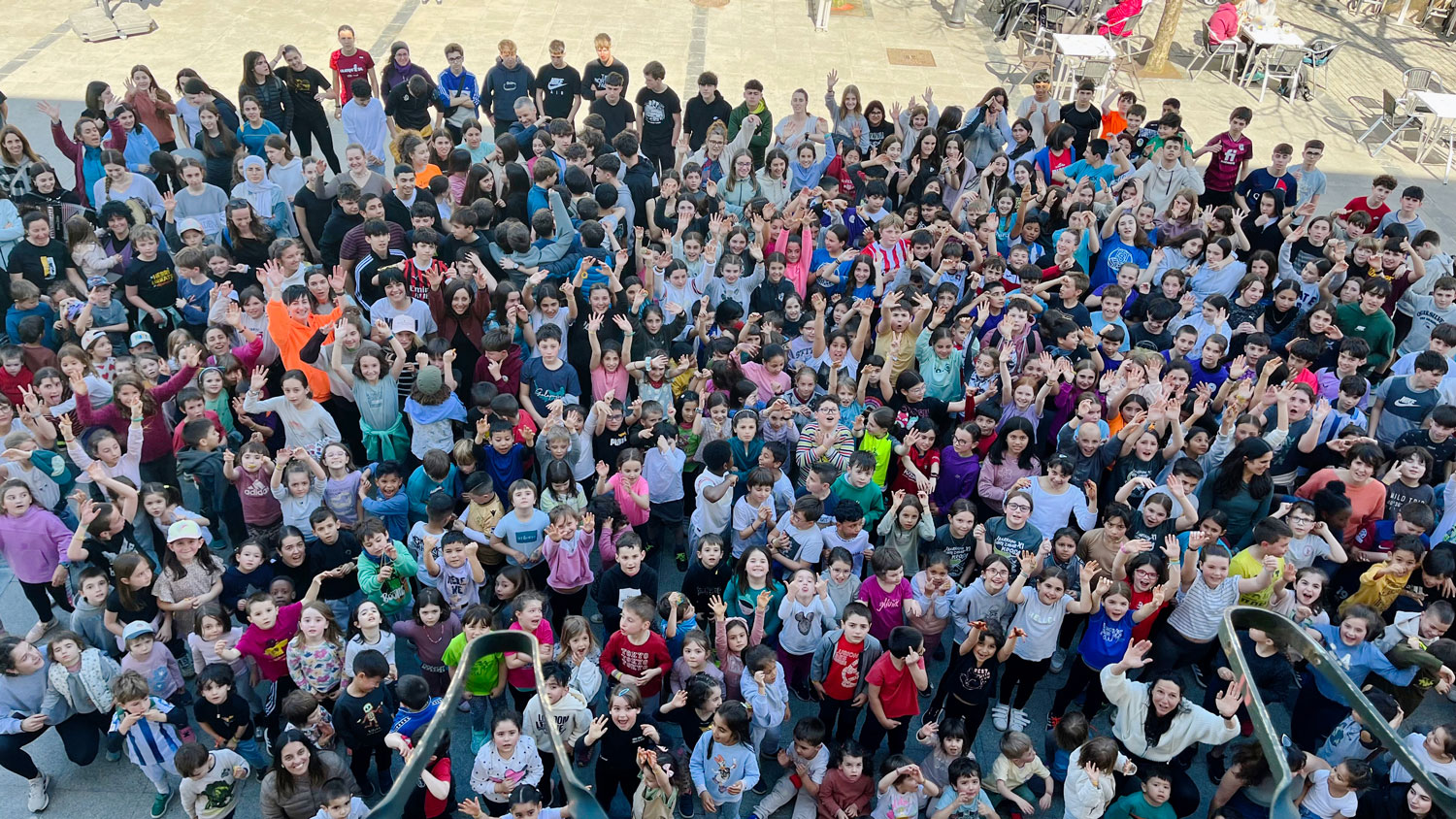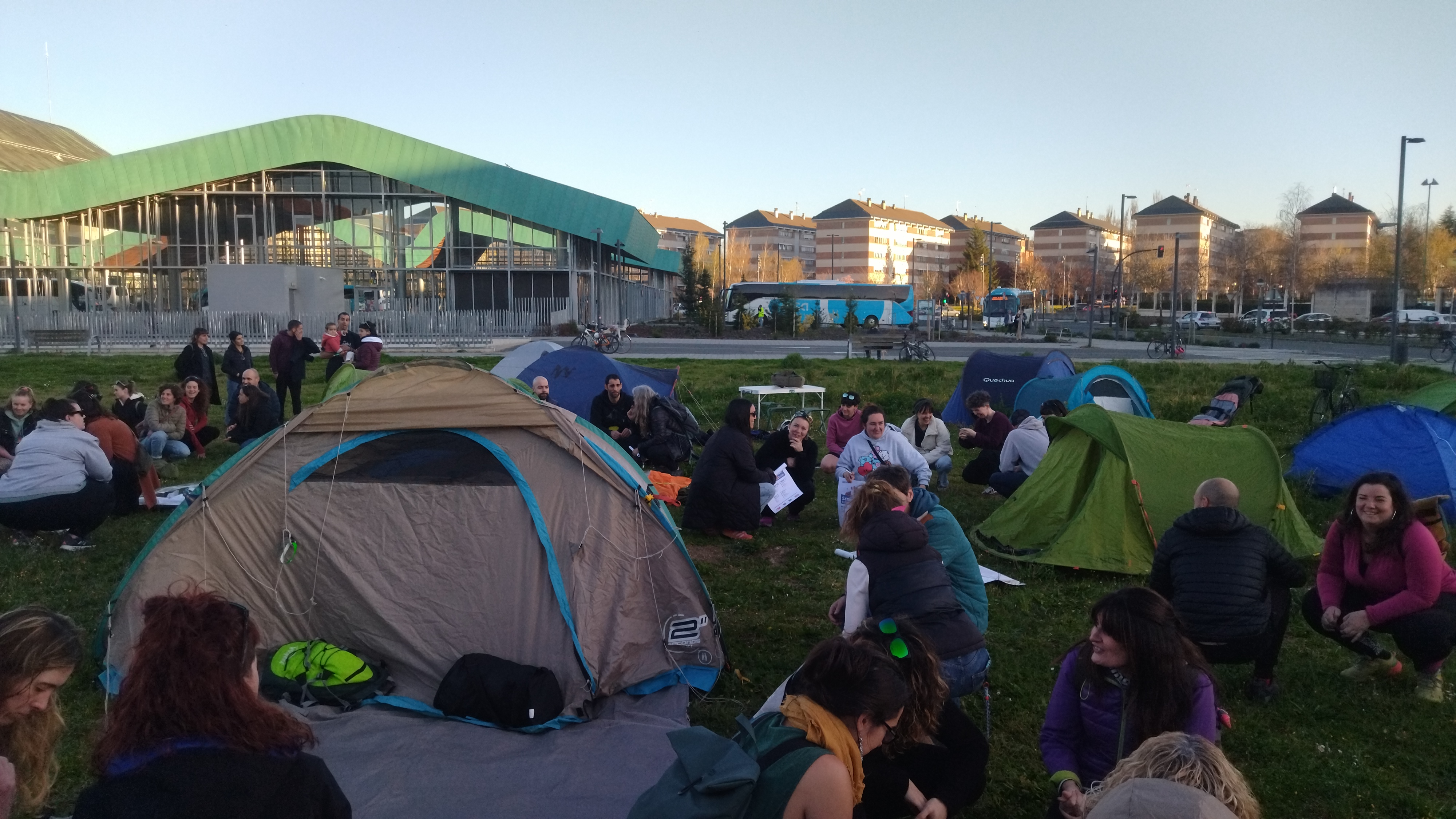"Through the theater, the student discovers other roles he has inside"
- Each course, Iurgi Etxebarria goes onstage to about 400 students from seven centers in Debagoiena. He has been teaching children theatre for ten years and experience has taught him how valuable theatre is to get to know and break roles, overcome embarrassment and fears, understand the body and work emotions, enhance creativity and teamwork…

For twenty years he worked in the Kukubiltxo theatre group. Why and how did he make the leap into the world of education? In
2010, I was asked to come with me at the theater workshop at the local school, and I also taught a course to the workers at a village company. I was at ease, and I thought I wanted to convey the knowledge and joy that the theater gave me. In addition, in a few years we went from two to five at home and the activity in Kukubiltxo was closely linked. I contacted the schools and municipalities of the valley, and so Iufala was born!! project to offer theatre courses in schools.
Before explaining to the students what theatre teaches them, what has it helped you?
It has helped me to better understand and understand people's attitudes. As a child, I received a Christian education that rigidly marked what are the good and bad behaviors, the good and the bad people, and I had this tendency to judge very internalized. All of a sudden, I went to the theater school in Bilbao, and all those judgments lost meaning, because in the theater we didn't judge our character, we have to try to understand it whatever the character is, we developed a certain assertiveness and empathy with the character. In addition, working with the imagination also leads to it: In Kukubiltxo we were very different by nature and the discussions that took place around the play or the characters were very enriching.
"In our works everyone has a similar protagonism, and the script is not finished, each one constructs and composes his character and his trajectory"
How does play influence the roles of the characters in the students?I work with 5th and 6th grade Elementary (10 to 12
years, 20 weeks a week, an hour) and usually have a role in school, but in the theater these roles change, from each student, and also as a group. From the beginning, for example, it is essential to break the limit of girls and boys, because if not, you always have girls on one side and boys on the other. In our works there are no protagonists, everyone has a similar protagonist, and the script is not finished, each one constructs and complements his character and his trajectory: the information they receive is the age of the character, his role in the play (if he is on the boat, he is the captain, he is the sailor...) and the situation of the character, but they choose the sex and the sexual orientation of the character, for example. When it was explained, among other things, that they can be transsexuals, in the play it was the usual question, “what is that?”, but the new generations take it more natural and some decide to change their role and their sex in real life. In addition to the role that the personal character has, in the class all students work different roles and feelings, one by one before the others: shame, fear, anger…
All this helps them to know themselves, to make others known and to rediscover what surrounds them. The one who is accustomed to being a leader in everyday life may be choked on stage or dumb, and the students who see more modest in other studies and fields are suddenly empowered in theater, for example, when they play a powerful role. This year I have a very humble student, on the role of captain, and he has to give orders to the class leader (on the role of sailor). I also remember the testimony of a tutor who told me that the reluctant student had grown up thanks to this course and that since then he had also advanced in other subjects.
He says he puts them on stage one by one. It is not always going to
be easy to face timid and fears… We go out on stage to have a good time, that is one of the bases, and that is why, among other things, in these years I have greatly reduced the text that I have to learn for the work: you only have to memorize three sentences, the rest create and correct themselves, because the need to learn from memory meant a blockade.
On the other hand, the phrase I stress from day one is that there are no errors in our course. The fear and shame of thinking that we are going to make some mistake on the stage, we have already internalized that others will judge us, but in the course we do many exercises in the opposite direction: that someone has forgotten the text? Instead of leaving it open, young people learn to move forward, to help each other, to invent a new text, to follow the text they have forgotten, to move forward without mentioning the text… To do so, we work improvisation and imagination, and they understand that “reaching the destination” is of no use if someone is on the way. We must all move forward together and reach the end of the play together.
"As we go onstage, we have internalized that others are going to judge us, but I do it from day one: in our course there are no errors"
The group is, therefore, importante.En the essays see that nobody judges them, that they do not laugh, that if they forget the text they will have the help of others… and that team
trust, trust and mutual support are developed. To get the student who fulfills the role of mother and the one who fulfills the role of child to embrace the stage, trust is necessary. Precisely, because of the pandemic, I have had to sacrifice many exercises related to this issue, because there is physical contact between them, and I am working in other ways, but I think it will be noticed that it is not treated properly.
You mentioned physical contact. The body itself is very present in theatre, when in education the brain in general bears all its protagonism. The body is
quite taboo at that age, and also everyone knows that, in a few years, your body will undergo changes. If I notice that you have complexes, for example, that your breasts have started to grow, I put your shoulders up and encourage you to show up fearlessly, not to be ashamed. We work the joints, the movements and the possibilities of the body, the expressiveness of the body, and in certain sections (the back, the chest...) you hear the rhythms, but I am the first person who takes all the postures through the body and I put all kinds of faces in front of the students. Just like the factory worker uses the machine, we are the machine in the theater, we must love and care for this machine and know all the resources and possibilities that this machine has.
I'm also talking about body memory. That when you practice a bicycle or a cord, the body automatically knows how to respond, as it keeps in memory what it has done previously.
The body attitude itself denounces the role we have in everyday life and we do an interesting exercise to address it. In the learning theater you have to look at the spectators, you have to extend your body to the spectators, the students start to walk on the stage and when I touch the hill they have to look forward, but where and how they have stood is very significant. Some stay behind their peers, others stand in the front row and cover the rest with their bodies. They become aware of what their bodies carry, hide or cover others, and learn that they have to leave their space to all members of the group to appear on the same level. This is terrible for the mind, because in the street these attitudes are repeated and with this exercise they realize it; they internalize how to share protagonism throughout the body, at least in the theater.
"They become aware of what their bodies carry, of hiding behind others or covering them, and learn that all members of the group have to leave their space"
To what extent is a closed theater play and to what extent does the imagination of the students participate?The script only shows the beginnings of the conversations, three sentences
in total, and the students themselves complete the interviews. The idea of not judging is also fundamental in this, so that when someone says an idea it is not the reaction “what barbarity he has thrown” or “that idea is bad”. In the theater everything is yes, we accept all the proposals, we test them and we will see if we will incorporate them into the play, if they have to be changed or if they do not work. It's not always easy to channel some ideas, because the imagination of children is freer than that of adults, they go further, but it's worth rehearsing and testing all the ideas, then it falls out of the work without force.
The theater also serves to work emotions and feelings.
Of course, and they experience intense emotions, such as, for example, in this process of mutual help. They usually escape from the need to interpret sadness or embarrassment (instead of anger is represented at ease), but when they do, they discover other roles that we carry within, to develop. All feelings are important, you don't have to neglect them, and I take advantage of the course to work that kind of values.
Do you also use the theme of works to work values?
The teachers themselves told me: “But this work does not promote any concrete value.” Not on the subject, but on the process itself: shared protagonism, role breaking, mutual help to advance… How does no value impulse! At one time I related the theme of the play with some value, but I quickly realized that it didn't work, that the theme and some characters took too much prominence and covered everything else. It is artificial: more effective than the theatre play on bullying is to try to cope through exercises if bullying is detected in the tests.
How has the pandemic affected these classes?
It has inevitably influenced, but, to cite a positive change, it has meant an increase in the effort they make with the voice: pronounce better, speak higher, work the voice... the use of the mask has propitiated the use of it and this work has come to stay.
"The imagination of the children is freer, they go further, but it is worth rehearsing and testing all the ideas, in the theater everything is yes"
Results of the tests: performance in public.
At first I didn't want to do performances, I thought it was going to take us time to work things in the classes, but it was a contribution from the teachers, in some way, for the students to give a sense and an objective to the course, and they were right: it's a time of catharsis. All the students, each in their character, end up celebrating an activity on the stage. They end up excited, together, in full scream. The pressure is to jump into the audience and be in the fokupa, but in all these years, only two or three times it has happened to me that the student can't get up in the chair, can't go onstage. Even in the two or three times that has happened, nobody has accused him of anything; on the contrary, they have told him to remain calm, to adapt and to carry out the work.
You're collecting everything you've learned in these years.
I am collecting the works and exercises that I did in the course, so that I then spread them on the web Apropox.com and that the educator or educator who wants to take advantage of them. In addition, it is intended to offer theatre courses not only in schools, but also in companies and the general public. I've also learned psychodrama, a therapy that is done in the group bringing problems to the scene, and I use it in my formations. I am convinced that, through interpretation, we can learn a lot.
The claim is yours: “All the students of Euskal Herria
need theatre.” And that's why I think we should work in theater at the School of Magisterium, so that future teachers can integrate it into the future, because they're techniques that can be used in any matter; theater provides tools to deal with problems. We are working in some centres, but it is something that must be disseminated to everyone. To work on personal development, among other things. I would like to know if the teachers who have received these courses have noticed some change in their students when they arrive at Compulsory Secondary Education. I want to think yes, it's good for you, so I'm still in this.
.jpg)
.jpg)
Public education teachers have the need and the right to update and improve the work agreement that has not been renewed in fifteen years. For this, we should be immersed in a real negotiation, but the reality is deplorable. In a negotiation, the agreement of all parties must be... [+]
Lehengai anitzekin papera egitea dute urteroko erronka Tolosako Lanbide Heziketako Paper Eskolako ikasleek: platano azalekin, orburuekin, lastoarekin, iratzearekin nahiz bakero zaharrekin egin dituzte probak azken urteotan. Aurtengoan, pilota eskoletan kiloka pilatzen den... [+]
Garai kuriosoak bizi ditugu eta bizi gaituzte, zinez. Hezkuntza krisian dela dioten garaiak dira eta, gutxien-gutxienean, aliritzira, ba aizue, 2.361 urte ditu gaurgero boladatxoak.
Ez zen ba debalde joan Aristoteles bere maisu maite Platonen akademiatik lizeo bat muntatzeko... [+]









